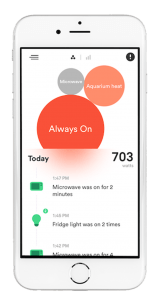The Sense Home Energy Monitor is a convenient tech-enabled option for homeowners that want a detailed understanding of their electricity use. Install the Sense monitor to your electricity panel and, with the help of an app, you’ll know which appliances are in use, how much you’ve used those appliances over time, and how you can reduce your electricity bill.
Why might an energy monitor be useful? If you’re a utility customer in the United States, you might be familiar with a monthly electric bill that includes two numbers: the amount you owe and the kilowatt-hours (kWh) you used.
But what if you wanted to know how much electricity your dishwasher used last month? Or how much electricity your air conditioner was using right now? Before the advent of energy monitors, you’d be out of luck. The Sense Home Energy Monitor, like other home energy monitors, works to solve that problem.
If you have solar panels installed, Sense and other solar compatible home energy monitors can also help you compare your electricity use to the amount you’re generating at any given time. That means you’ll know exactly when to schedule activities requiring a lot of electricity and could learn how to decrease your electricity use at night.
The basics: how the Sense Home Energy Monitor works
The Sense Home Energy Monitor connects to your electricity panel, reads the type of electricity being used, and delivers its findings to your phone or desktop computer. The findings, like how much your water heater is costing you per month, will give you actionable information for saving on electricity and making your home more efficient. The device is listed at $299, or $349 for the solar-enabled model.
When you install the Sense monitor, the device will immediately start reading your electricity use. As it reads the data, it will recognize the “electricity signatures” associated with your home’s appliances. Each appliance you have in your home uses electricity in a unique way. Your iron is a little different than your microwave, and your microwave is different than a TV. Sense recognizes these differences and, using machine learning, eventually understands when each device is in use.

It may take a couple days to a few weeks of use before Sense recognizes the majority of your devices. At that point, when you open your app you’ll see the “Now” screen. It presents circles of different sizes. Each circle represents a different device and contains information on how much power is being used by that device in real time. (Cheat sheet: a bigger circle means more electricity use.)
Underneath the circle you’ll see a list of the day’s major events, like a dishwasher turning on or a garage door opening. If you want to understand your use of that device in more detail, you can tap the circle to see that device’s use history. To know how much all this electricity use costs you, you can enter your standard electricity rate and Sense will do the math for you.
Sense has a few other views that give you a more detailed look at your use over time and by device. The Trends screen gives a breakdown of your average use by day, week, month, and year. You can also get a ratio of use by device, so in those hot summer months when you’re electricity bill goes up you’ll whether your air conditioner is to blame.
Finally, a Device screen allows you to set custom alerts by device. With simple alerts you can ask Sense to notify you when a device is turned on or off. Custom alerts notify you when a certain device is on for a specified period of time. If you have a habit of leaving the oven on for hours after you’re done cooking, this feature alone might make a Sense worth the investment.
Installing a Sense Home Energy Monitor
When you order the Sense Home Energy Monitor you’ll receive the monitor, an antenna, current sensors, and a power cable out of the box. Though the installation is pretty brief, it’s a good idea to have an electrician help you. The monitor itself can live inside your electrical panel or be mounted on a wall nearby. Once the monitor is in place you will attach the current sensors to your power line, a power cord to the device, and an antenna.
Get more out of your Sense by pairing it with solar
The Sense Solar Bundle will allow you to track the electricity you’re using as well as the energy you’re generating. Installing an energy monitor during your solar installation will allow you to make the most of both investments.
With the Solar Bundle, you can track your current use plotted next to how much energy your panels are generating in the app on the Now screen. That way you’ll know in real-time if you’re using more electricity than your panels are producing.
Final take on the Sense Home Energy Monitor
The Sense Home Energy Monitor is a smart gadget that can make you more knowledgeable too. If you can give it a few weeks to learn your devices’ signatures, you should see a return on your investment. The more Sense learns, the more information you’ll have to make smart energy decisions about the devices in your home.
To learn more about the Sense Home Energy Monitor and other home energy monitors, visit the home energy monitor marketplace. If you own a Sense Home Energy Monitor, share your experience – write a review of Sense today.






